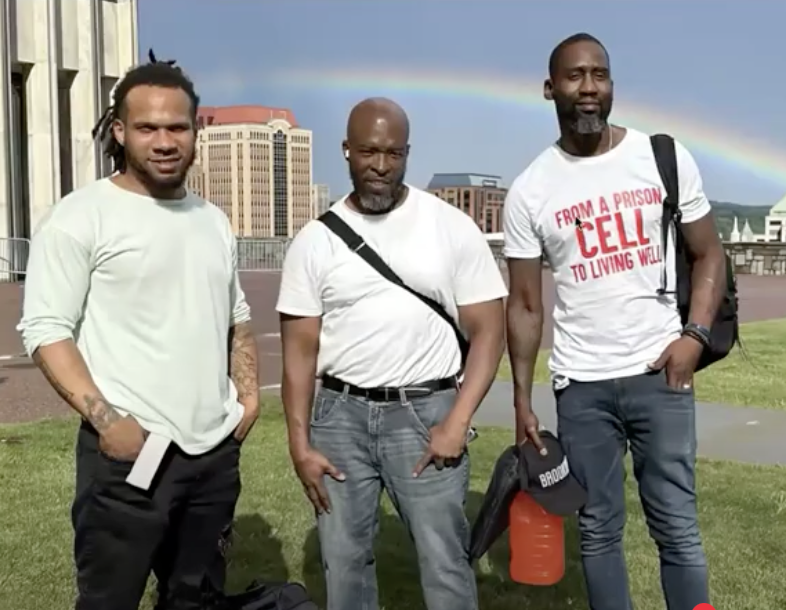
Each year, DHPSNY Dialogues bring cultural heritage professionals together to engage in meaningful discussions about the challenges and opportunities shaping our field. In 2025, our series focuses on Collections for the Future of New York, asking: What can we, as practitioners — both paid and volunteer — do to build and steward collections for the communities of tomorrow?
At our September 15 program, Welcoming and Inclusive Archive Practices: Experiences of the Formerly Incarcerated, A Case Study, Aria Camaione-Lind of Aria Strategies co-facilitated a conversation with scholars Dr. Richard McKay, Kevin Kareem Brooks, and Leon “Struggle” Davis. Together (and with Reggie Qualls), they were part of a research team that explored records held at the New York State Archives as active witnesses of institutional control and the lasting impacts of carceral systems. The team spoke to aspects of what it can look and feel like to be conducting archival research as formerly incarcerated individuals, and ultimately engaging in “transformative history” processes through their work.
The following is a personal recap shared from Leon “Struggle” Davis; Activist, Researcher, and Voice of the Voiceless:
When Dr. Richard McKay entered the New York State Archives with three formerly incarcerated researchers, the task was never simply about history. It was excavation — a search for the roots of what we call carceral sickness, the long-standing practice of dehumanization through classification, medicalization, and the cold language of science. McKay set the stage, reminding us that archives are not neutral repositories but active witnesses. They hold testimony of how institutions used knowledge to control and how bureaucratic record-keeping became a cage of its own.
From there, Kevin Kareem Brooks picked up the thread. To him, the archives felt like “a big bank with free money in it.” Yet what he uncovered was no treasure — it was the commodification of life itself. Pedigree forms, medical notes, and psychiatric files turned men into specimens, their humanity measured in defects and diagnoses. Brooks revealed that language was not innocent: it functioned as currency in an economy of control, reducing flesh-and-blood people to pathological entries.
Reggie Qualls carried the thread further through his study of the 1923 Napanoch riot. The officer reports he unearthed reframed protest as pathology, resistance as deviance. These official scripts — eerily familiar today in disciplinary hearings and parole narratives — demonstrated how state language not only justified punishment but also erased truth. Qualls showed that the dehumanization preserved in those records continues to echo across generations.
Finally, Leon “Struggle” Davis returned to the archives just months after release. For him, the files confirmed what lived experience had already taught: carceral sickness mutates through words. Labels like “defective,” “delinquent,” and “psychopath” did more than describe — they created identities that outlived the men themselves, identities that haunt families and communities to this day.
Together, McKay, Brooks, Qualls, and Davis wove a single thread: the weaponization of language as the foundation of carceral sickness. The archive is not silent — it indicts. And it calls us to act. If prisons were built on diseased ideas preserved in these vaults, then academia must open its doors, inviting those who have lived the history to reclaim it. Only then can testimony become justice, and history a tool for transformation.
Access the recorded portion of the session.
View or download the slideshow.
💡 If you attended this event, we'd love to hear your feedback to help improve future programming by completing this survey.
Resources for Further Study
- Who Would Believe a Prisoner? Indiana Women’s Carceral Institutions, 1848-1920, by the Indiana Women’s Prison History Project, edited by Michelle Daniel Jones and Elizabeth Angeline Nelson (New York: The New Press, 2023).
- Christina Sharpe, In the Wake: On Blackness and Being (Durham, NC: Duke University Press, 2016).
- Eddie Ellis, "An Open Letter to Our Friends on the Question of Language," Centre for NuLeadership on Urban Solutions, January 2020.
- Lila McDowell and Sean Pica, “Preparing the World to Receive Them: Successful Hiring and Retention of Legal System-Impacted People in the Field of Higher Education in Prison,” in The Bloomsbury Handbook of Prison Education (London: Bloomsbury, 2024), edited by Erin S. Corbett.
- Correction History website: https://www.correctionhistory.org/.
- Imperial Debris: On Ruins and Ruination by Ann Laura Stoler.